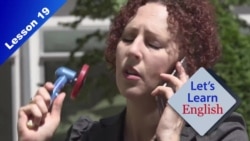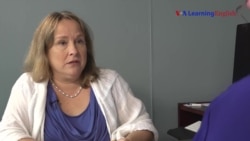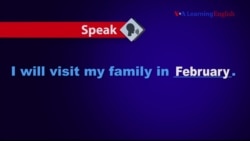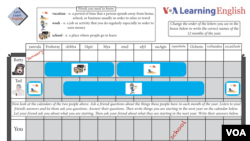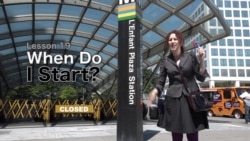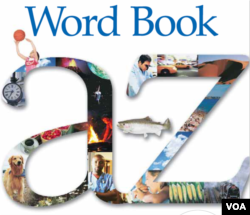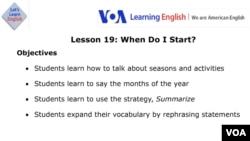Lesson 19: When Do I Start?
Let’s Learn English เปิดโอกาสการเรียนรู้และฝึกทักษะภาษาอังกฤษ ในรูปแบบที่ถูกออกแบบโดยผู้เชี่ยวชาญตามมาตรฐานการศึกษาของอเมริกา เพื่อให้เนื้อหาเหมาะสำหรับผู้เริ่มเรียนภาษาอังกฤษ
เรานำเสนอ 52 บทเรียน และทุกๆ 5 บทเรียน จะมีการทบทวนสิ่งที่เรียนไปแล้ว
ทุกสัปดาห์จะมีบทเรียนใหม่ พร้อมด้วยวิดีโอ ที่สะท้อนชีวิตชาวอเมริกันรุ่นใหม่ ผู้เรียนจะได้ฝึกการพูด เขียน และจดจำคำศัพท์
นอกจากนั้นผู้เรียนสามารถพิมพ์บทเรียนที่ทำแล้ว ผลการฝึกฝน และแผนการฝึกเรียนภาษาอังกฤษในบทต่อๆ ไปได้
เราอยากให้คุณติดตามบทเรียนใหม่ๆ ทุกสัปดาห์ และบอกให้เรารู้ถึงการเรียนรู้ของคุณผ่านการแสดงความคิดเห็น (comment) และอีเมล์ของเราที่ thai@voanews.com
เรื่องย่อ
แอนนาต้องเดินไปทำงานเพราะรถไฟฟ้า (Metro) หยุดให้บริการชั่วคราว เธอจึงต้องโทรศัพท์ไปหาหัวหน้าของเธอว่าจะไปทำงานสาย แต่ปรากฏว่า คุณวีฟเวอร์ ต้องการให้เธอรีบเข้ามารับมอบหมายงานชิ้นใหม่ แอนนาจะทำอย่างไร?
ฝึกพูด
ฝึกออกเสียงคำศัพท์ใหม่ในบทเรียนนี้ ว่าด้วยการออกเสียงชื่อเดือนต่างๆ เป็นภาษาอังกฤษ การใช้ which เพื่อให้ทางเลือกกับคู่สนทนา และการใช้ every หรือ next เพื่อเป็นคำระบุช่วงเวลาได้
ฝึกออกเสียง
ในคลิปวิดีโอนี้ คุณจะได้เรียนรู้การออกเสียงเดือนกุมภาพันธ์
บทสนทนา
ฝึกเขียน
คุณมีทักษะอะไรบ้าง? และคุณใช้ทักษะอะไรในการทำงานหรือการเรียน? เขียนมาเล่าให้ฟังเกี่ยวกับทักษะที่คุณมีสัก 2-3 อย่าง ในช่องแสดงความเห็น หรือ อีเมลหาเรา คุณสามารถดาวน์โหลด เอกสารประกอบการเรียน และฝึกพูดกับเพื่อนเกี่ยวกับสิ่งที่คุณทำในแต่ละช่วงเวลาของปี
กลยุทธ์การเรียนรู้แบบลัด
Learning Strategies หรือ กลยุทธ์การเรียนรู้ คือความคิด ความตั้งใจ และการกระทำ ที่ช่วยให้การเรียนง่ายขึ้น หรือมีประสิทธิภาพมากขึ้น
กลยุทธ์การเรียนรู้ของตอนนี้ คือ การสรุปความ (Summarize) ในคลิปวิดีโอนี้ คุณจะได้ยินคุณวีเวอร์พูดกับแอนนาว่า "คุณเก่งในการถามคำถาม และเก่งในการพูดคุยกับผู้คน คุณเก่งในการแสดงอารมณ์ และเก่งในการทำตัวสนุกสนาน" แอนนาไม่เข้าใจว่าทำไมคุณวีเวอร์ถึงพูดเรื่องทักษะของเธอนัก จึงได้ถามว่า "สิ่งเหล่านี้หมายความว่าอะไร?"
ในการตอบคำถามแบบนี้ คุณวีเวอร์จึงสรุปว่า "ฉันมีงานใหม่มามอบหมายให้กับเธอ เพราะทักษะของเธอเหมาะสมกับรายการใหม่นี้มาก .. นั่นคือ .. รายการเด็ก" เมื่อเราสามารถสรุปได้ เราจะสามารถเล่าเรื่องราว หรือรายงานข้อมูลด้วยคำที่น้อยลงได้ และสามารถให้ข้อมูลที่สำคัญโดยไม่เสียเวลาลงรายละเอียดมากมาย การสรุปความจะช่วยให้เราจดจำข้อมูลใหม่ๆ และฝึกฝนการใช้คำศัพท์ใหม่ได้
และคุณได้ใช้หลักการสรุปความในการเรียนภาษาอังกฤษอย่างไร? เขียนหาเราในช่องแสดงความเห็น หรือ อีเมลหาเรา
สำหรับครูผู้สอน คลิกที่ Lesson Plan เพื่อดูกลยุทธ์การสอนในบทเรียนนี้
แบบทดสอบการฟัง
ทดสอบความเข้าใจในบทเรียนนี้ด้วยแบบทดสอบการฟัง คลิกที่วิดีโอนี้ และเลือกคำตอบที่ดีที่สุด
______________________________________________________________
คำศัพท์ใหม่
______________________________________________________________
เอกสารประกอบการเรียน
ดาวน์โหลด VOA Learning English Word Book ซึ่งเป็นเอกสารรวมคำศัพท์ที่ใช้ในเว็บไซต์นี้
ในแต่ละบทเรียนของ Let’s Learn English เรามีชุดฝึกทบทวน Activity Sheet สำหรับการฝึกเพิ่มเติมที่คุณทำได้เอง
สำหรับครูผู้สอน
คลิกที่ Lesson Plan ในบทเรียนนี้ เพื่อเป็นแนวทางในการเรียนการสอนในห้องเรียนของคุณ หรือ อีเมลหาเรา หากมีคำถามหรือคำแนะนำในหลักสูตรนี้
ไวยากรณ์ที่ควรใส่ใจ
การใช้ which แทนคำคุณศัพท์กับคำสรรพนาม
การใช้คำคุณศัพท์ next และ every
หัวข้อหลักในบทนี้
การระบุชื่อเดือน
การพูดเกี่ยวกับฤดูกาลและกิจกรรมต่างๆ
กลยุทธ์การเรียนรู้แบบลัด
การสรุปความ (Summarize)
การฝึกพูดและการออกเสียงที่ควรใส่ใจ
การใช้คำว่า which กับ which one เพื่อให้ทางเลือก
การใช้ every และ next กับการแสดงเวลา
การออกเสียงเดือนกุมภาพันธ์ (February) เป็นภาษาอังกฤษ
______________________________________________________________
ตอนนี้คุณสามารถบอกเราได้ว่าคุณคิดอย่างไรกับบทเรียนนี้ ด้วยการเขียนอีเมลหาเรา หรือแสดงความคิดเห็นมาที่ช่องแสดงความคิดเห็นด้านล่าง หรือส่งมาทางหน้า Facebook




